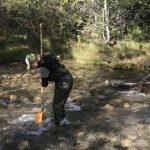Columbia Basin Water Hub formally launched
 We are pleased to officially announce the launch of the Columbia Basin Water Hub.
We are pleased to officially announce the launch of the Columbia Basin Water Hub.
An open source database using a CKAN instance customized to house water-related data in the Upper Columbia Basin (UCB), the Columbia Basin Water Hub is an initiative that was begun by Living Lakes Canada in 2017 in response to a series of reports pointing to the need for increased water monitoring data amid climate change impacts on water supply in the UCB region. In starting the dialogue around a Columbia Basin Water Monitoring Framework to fill important data gaps, we also envisioned an online platform to house that data to make it easily accessible by decision makers and the public in order to facilitate progressive watershed management in an era of climate change.
Now, the Columbia Basin Water Hub (or Water Hub) is up and running. Water-related data can be submitted by community-based monitoring groups or by municipal, regional or First Nations governments, and industry. Data can be linked to any existing databases that are available openly online. The Water Hub will also be one of the hosts of the main database for Foreshore Integrated Management Planning (FIMP) data collected in partnership with the Department of Fisheries and Oceans.
VISIT WWW.CBWATERHUB.CA

Through the Water Hub, water data collected by a variety of organizations and institutions will be housed in a central repository and will not be lost once data collection has concluded. A range of datasets are available, including water quantity and quality, groundwater levels, wetland monitoring, snow surveys, glacier studies, reports, images and various other forms of knowledge.
Water datasets collected in the Water Hub are easily accessible to anyone who needs it, whether they are a high-level decision maker required to make freshwater allocation decisions, or a researcher, or a member of the public wanting to learn more about their watershed. The public, researchers, and decision makers can easily access the information that they are interested in.
Our database team has worked diligently to ensure a user friendly experience. After hosting a series of three webinars in December attended by 34 participants representing water stewardship groups, First Nations, consultants, etc. in the Columbia Basin, we received excellent feedback which, combined with results from a Columbia Basin Water Survey that LLC distributed in January, informed the development of easy-to-use upload templates, a quality control and assurance protocol, a data grading scheme, terms of use, and data sharing agreements.
We have currently collaborated with 10 local stewardship organizations. If you want to find out more about how your organization can benefit from this open source data platform, please contact either Database Manager Santiago Botero or Database Assistant Paige Thurston.
Hub is home to federal FIMP data
The Water Hub is now the official master database for all Foreshore Integrated Management Planning (FIMP) data. The integration of a new QA/QC protocol for FIMP along with a new viewing platform and landing page that will offer a comprehensive explanation and overview of FIMP data will be completed March 2021. The work is being done in partnership with the Department of Fisheries and Oceans, Foundry Spatial, and Ecoscape. We will continue to build new and varied partnerships to increase the reach of our data network and to ensure data longevity and that data collected supports decision-making for climate adaptation.
Water Hub outreach continued
This past winter, we made the following presentations:
- Selkirk College Bridging Silos Conference (Exhibit Hall) – March 2020
- Regional District of Central Kootenay Board Meeting – February 2021
- Water Innovation Lab Mexico-Canada 2021 – January 2021
- Webinar Series: Explore the Columbia Basin Water Hub – December 2020
- Watersheds 2020: Stepping Stones to Collaborative Watershed Governance – October 2020
The Water Hub has recently been featured in the following articles:
- Living Lakes Canada: A Shining Example of Collaboration! – Waterbucket eNews, The Partnership for Water Sustainability in BC, March 2021
- Empowering communities through open access to water data in the Columbia Basin – Our Living Waters, February 2021
We will host a second webinar series this spring with dates and registration information TBA:
- Day 1: an overview of the Water Hub and its capabilities;
- Day 2: a scenario-based discussion about decision making regarding water resources;
- Day 3 in two parts: Part A – diving deeper into data, data uploads and formatting; Part B – focus on accessing data using the Water Hub’s API, and future opportunities for analysis and training.
Part B will be a BYOD (bring your own data) event and targets those not afraid of a few lines of code or using new software to explore data.
We look forward to a broad reach of receiving continued user input and providing user friendly access to water data to support communities’ ability to protect and manage water resources. This project is only as successful as the participants wish to make it. Thank you to all our partners and participants to date.
For further information or questions pertaining to the Columbia Basin Water Hub, please contact Database Manager Santiago Botero: santiago@livinglakescanada.ca





